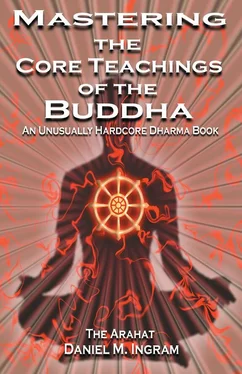Daniel Ingram - Mastering the Core Teachings of Buddha - An Unusually Hardcore Dharma Book
Здесь есть возможность читать онлайн «Daniel Ingram - Mastering the Core Teachings of Buddha - An Unusually Hardcore Dharma Book» весь текст электронной книги совершенно бесплатно (целиком полную версию без сокращений). В некоторых случаях можно слушать аудио, скачать через торрент в формате fb2 и присутствует краткое содержание. Год выпуска: 2009, ISBN: 2009, Издательство: Aeon Books, Жанр: Старинная литература, на русском языке. Описание произведения, (предисловие) а так же отзывы посетителей доступны на портале библиотеки ЛибКат.
- Название:Mastering the Core Teachings of Buddha - An Unusually Hardcore Dharma Book
- Автор:
- Издательство:Aeon Books
- Жанр:
- Год:2009
- ISBN:9781904658405
- Рейтинг книги:5 / 5. Голосов: 1
-
Избранное:Добавить в избранное
- Отзывы:
-
Ваша оценка:
- 100
- 1
- 2
- 3
- 4
- 5
Mastering the Core Teachings of Buddha - An Unusually Hardcore Dharma Book: краткое содержание, описание и аннотация
Предлагаем к чтению аннотацию, описание, краткое содержание или предисловие (зависит от того, что написал сам автор книги «Mastering the Core Teachings of Buddha - An Unusually Hardcore Dharma Book»). Если вы не нашли необходимую информацию о книге — напишите в комментариях, мы постараемся отыскать её.
Mastering the Core Teachings of Buddha - An Unusually Hardcore Dharma Book — читать онлайн бесплатно полную книгу (весь текст) целиком
Ниже представлен текст книги, разбитый по страницам. Система сохранения места последней прочитанной страницы, позволяет с удобством читать онлайн бесплатно книгу «Mastering the Core Teachings of Buddha - An Unusually Hardcore Dharma Book», без необходимости каждый раз заново искать на чём Вы остановились. Поставьте закладку, и сможете в любой момент перейти на страницу, на которой закончили чтение.
Интервал:
Закладка:
The first point is one that I have made implicitly above, but will make explicit here: Go ahead and get some deep insight to integrate in the first place. I have lots of friends on the spiritual path that seem to be doing work that I associate with integration when they don’t yet have any fundamental insight to integrate. This seems to be very strange way to go, if you ask me. They seem to be working on their stuff without the clarity and perspective that comes from realizations into the truth of things. Go get enlightened! Become a stream enterer at the very least and preferably become an arahat. Without these realizations, it is very hard to determine what needs work and what is just excessive delusion and mind noise created by the illusion of duality that still remains.
Thus, when on retreat or doing formal practice, think carefully about what you want to achieve. Do you want to work on your stuff or work on fundamental insights? Realize that it might not be easy to do either, and so might be very hard to do both simultaneously. Do you want to gain deep insights and then work on your stuff from that foundation of basic clarity, or do you want to work on your stuff until, until, until when? Until you don’t have any stuff? Good luck!
That brings me to the second point, which is to pick your battles.
We can’t do everything. We can’t have it all. We simply don’t have the time or the energy. Spiritual technology will not change these simple facts of life. We can only be working on so many things at once and still
Integration
do any of them well. We need breaks, downtime, and balance.
However, if we are wise and discerning, we can craft a set of priorities for ourselves that honors our unique spiritual needs, relationship needs, career needs, recreational needs, and family needs, as well as the needs of others. We can do this in a way that is realistic and allows us to keep making good use of our life without burning out or stagnating. No one can ever tell you exactly how to do this. You have your own needs and life situation. Work with it as best you can.
The third point about integration and living in the world that I have had to learn the hard way is a concept that I recently heard articulated very well by my friend Tom in the phrase, “Right plane, right time,”
which was his way of saying, “Use the correct conceptual and paradigmatic framework for the correct situation.” Like the simple lists of Part I, this phrase could be the basis of an entire book (see the difficult but excellent The Spectrum of Consciousness, by Ken Wilber, which spends a lot of time explaining how to keep our paradigms straight and not mix them up). From the point of view of integration, it basically means that one generally should use a way of approaching a situation or problem that fits with that situation or problem. One should be conscious of the conceptual frameworks that one uses when approaching each aspect of one’s life, as some conceptual frameworks or ways of being may not be helpful or appropriate for certain situations.
I will illustrate this by way of some examples.
When doing insight practices, is it useful to assume a few things.
One should assume that no such thing as a body exists, nor does a mind exist, nor are there natural boundaries inherent in sensations. There are sensations that arise and pass quickly, are not able to satisfy due to the illusion of duality, and are “empty,” meaning that they imply no self or separateness that is in control. It is not all that useful to get overly concerned with what these sensations actually are or why they arose.
When doing just about everything else, this way of proceeding may cause gigantic problems. For instance, when driving a car, one must assume that one’s car is a separate entity, one that should not collide with the other cars on the road. One must assume solidity and that one is in control of one’s car, one must pay attention to the edges of specific things, and be careful about the details of one’s driving environment, 334
Integration
one’s destination, and the rules of the road. For “real world” problems, I have found that “real world” solutions are the way to go. Right plane, right time. It must also be said that paying more attention to our sensate world helps both with insight practices and the “daily life.”
Another example to contrast with the paradigm useful in insight practices is in human relationships. Imagine someone saying to you,
“You are so empty. You are so unsatisfactory. You are so transient.” It just doesn’t work. Imagine going into a bank at which you have recently overdrawn your account and saying, “I do not exist as a separate entity.
There is no ‘I’ or ‘mine’ that can be found. Thus, all of this talk of me owing you something is nonsense. We are interdependent luminosity.”
This just doesn’t fly. Right plane, right time. These are ridiculous examples, but if you hang out in spiritual scenes and pay attention to the conceptual frameworks people use and when they use them, you will find numerous similar errors in judgment.
These examples also illustrate the important concept of being careful when talking about one’s practice. Chose the correct words or degree of silence for the people around you and the situations in which you find yourself, particularly soon after dramatic occurrences. I can’t tell you the number of times I have looked like a completely inconsiderate nutcase when I opened my big flapping pie-hole to the wrong people soon after some intense insight or rapture had occurred.
As a dead French occultist once said, “To tell someone something they can’t understand is as bad as telling them a lie.” Wise words. Cultivate a network of friends with whom you can share these things, or keep a diary if this is not practical, or both. There is something helpful about being able to talk about unusual things in a safe and appropriate context.
It is not uncommon for people who get deeply into practice to encounter two issues: that it is difficult to learn to go easily between one way of being and another, from one conceptual framework and another, and that practice and “the world” seem to be in direct conflict. Given our basic dualistic illusion, it often seems that we must let things go in some sort of literal sense, such as quitting a job, in order to “let it go” in the insight sense, to see the true nature of the sensations that make up the process. This is obviously not true, but such erroneous logic can be very tempting.
335
Integration
As to the rest of integration, well, if we have insights to integrate, it just seems to happen. That’s about the best I can do. Life happens as before, and so it goes. We grow, we learn, we get sick and we die. To quote a song from a Bogart movie, “The fundamental things apply as time goes by.” Go and read some extensive book on the subject and tell me whether or not it basically said the same thing while using a whole lot more words to do so. Still, such books can be helpful.
336
Mastering the Core Teachings of the Buddha
33.IT IS POSSIBLE!
So why am I mentioning all of these states and stages that are thought by many to be largely mythical and unattainable? Because they are absolutely otherwise, that’s why. People do attain these states today, though they tend to only talk about them to their teachers and to close friends who have enough experience in this stuff to understand and not have odd reactions to these disclosures. I assure you that I wouldn’t have bothered writing all of this if I didn’t think that it was possible for those reading this book to master this stuff.
A friend of mine was on a retreat in Burma and had attained to second path as confirmed by U Pandita. He was finally done with his retreat and was taken to the airport by one of the people who helped to run the monastery, who incidentally was a stream enterer. As my friend was leaving, he yelled to him across the terminal, “Come back for number three!” meaning, “Come back and attain third path!” Note the many ways in which what underlies this statement differs from the paradigm you would likely find in your basic Western Buddhist.
Читать дальшеИнтервал:
Закладка:
Похожие книги на «Mastering the Core Teachings of Buddha - An Unusually Hardcore Dharma Book»
Представляем Вашему вниманию похожие книги на «Mastering the Core Teachings of Buddha - An Unusually Hardcore Dharma Book» списком для выбора. Мы отобрали схожую по названию и смыслу литературу в надежде предоставить читателям больше вариантов отыскать новые, интересные, ещё непрочитанные произведения.
Обсуждение, отзывы о книге «Mastering the Core Teachings of Buddha - An Unusually Hardcore Dharma Book» и просто собственные мнения читателей. Оставьте ваши комментарии, напишите, что Вы думаете о произведении, его смысле или главных героях. Укажите что конкретно понравилось, а что нет, и почему Вы так считаете.












